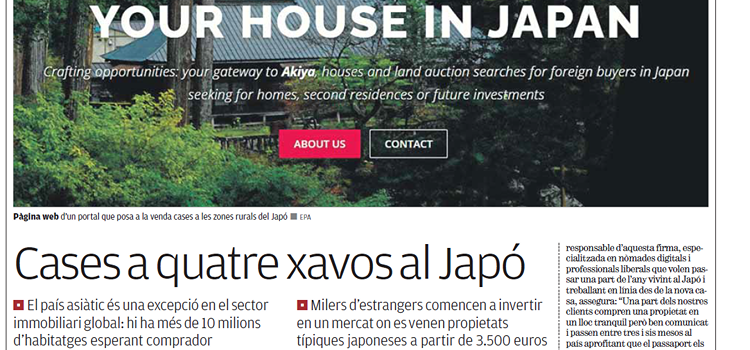
The Catalan newspaper El Punt Avui offered an extensive article last week on the state of the real estate market in Japan, highlighting the innovative offer of proposing auctioned houses to foreigners by Your House in Japan.
You can read the original article in Catalan here or the translation we offer below:
Very Cheap Houses in Japan
· The Asian country is an exception in the global real estate sector: there are more than 10 million homes waiting for a buyer.
· Thousands of foreigners are starting to invest in a market where typical Japanese properties are sold starting from 3,500 euros.
· Many buy a property, reside part of the year, and rent the rest to recover the investment.
The Japanese real estate market is experiencing one of the strangest moments in its history: while real estate prices in Tokyo reach figures not seen since the 1980s bubble, largely due to foreign investors competing with Japanese entrepreneurs due to the lack of luxury housing supply in the country, more than ten million homes across the country are patiently waiting for a buyer. While in Catalonia it is increasingly difficult to access a home in ownership, in Japan, there are abundant empty houses at surprisingly low prices—some starting from 3,500 euros—and most come with farmland.
According to data from the Tokyo Kantei consultancy, the price per square meter of housing reached 1.62 million yen (10,247 euros) in the third quarter of last year, surpassing the previous peak of 1.4 million yen (8,861 euros) recorded in 1990, and the average price of new apartments has set a record, rising to 88.7 million yen (560,000 euros) in the first semester. Although prices are still below those of other metropolises, numerous analysts argue that they have reached levels considered unaffordable for most residents. This situation contrasts, in particular, with areas of comparable dimensions, such as Hong Kong. According to one of the international real estate consultancy firms, the average price of a home is 1,344,637 euros, with a range from 450,000 to 9.5 million euros.
On the other side of the scale are the suburban and rural areas of the country, where some are trying to revitalize by inviting families to live and offering free houses if they meet certain conditions, such as being legal residents in the country, having a family with members under forty, one or two children, etc. Japanese local governments prefer to offer these abandoned houses for free because, otherwise, they can affect the landscape and be dangerous if they collapse.
Although many municipalities have established new taxes to encourage owners to demolish or maintain houses, the decline in the Japanese population has left many homes unclaimed. Many of these residences have been abandoned for various reasons, although the main cause is usually the death of the original owner. Sometimes, an heir refuses to accept the house left to them by their relatives, or the relatives to whom the house has been transferred do not need it and do not want to sell the family land out of respect. In any case, the result is usually the same: an empty house that is left abandoned and deteriorating.
To try to encourage families to move from large cities to rural areas, local and regional institutions throughout the country have launched websites where lists of properties are compiled. Still, some in the private sector do not believe that these government solutions adequately help interested buyers and have created their own companies to facilitate transactions. One such company is Your House in Japan (www.yourhouseinjapan.com), a Euro-Japanese consortium specializing in house auctions that help foreign citizens acquire real estate in the country.
One of the first doubts many clients have is whether foreigners can acquire properties in the country, explains real estate auction expert José Miguel Ywasaki from the consortium. “Japan is a very stable country that offers legal security comparable to the best European standards,” he assures. The head of this firm, specializing in digital nomads and freelancers who want to spend part of the year living in Japan and working online from the new home, says, “Some of our clients buy property in a quiet but well-connected place and spend between three and six months in the country, taking advantage of their passport, allowing them to be on a tourist visa for up to six months a year.” “They work from home part of the day, and the rest of the time, they dedicate themselves to enjoying the country,” explains Ywasaki.
“Many of our clients renovate their homes to make them as comfortable as possible for their work and leisure purposes while respecting the country’s architectural traditions, and later, in the times of the year when they do not reside in the country, they rent them to other freelancers or on platforms like Airbnb, and in a few months, they usually recover the investment made in the property,” reveals Ywasaki. And many have the possibility of avoiding paying taxes in any country since they cannot be considered tax residents.
“Currently, Japan has many advantages for foreign citizens: with the yen registering historic lows, the cost of living in Japan is relatively low compared to other developed countries, making it easier for our clients to save money and live comfortably,” comments Ywasaki. But this is not the only virtue that Japan has to make the idea of residing in it partially attractive: the insignificant crime rate and safety, as well as its excellent transportation infrastructure, healthcare, and education, make the country a magnificent option for those seeking an affordable, safe, and attractive place to live and work at least part of the year.
If you’re interested in owning property in Japan, don’t hesitate to reach out to us via WhatsApp at +81 80 8027 2344 or by email at sales@yourhouseinjapan.com. We’re here to assist you every step of the way.
